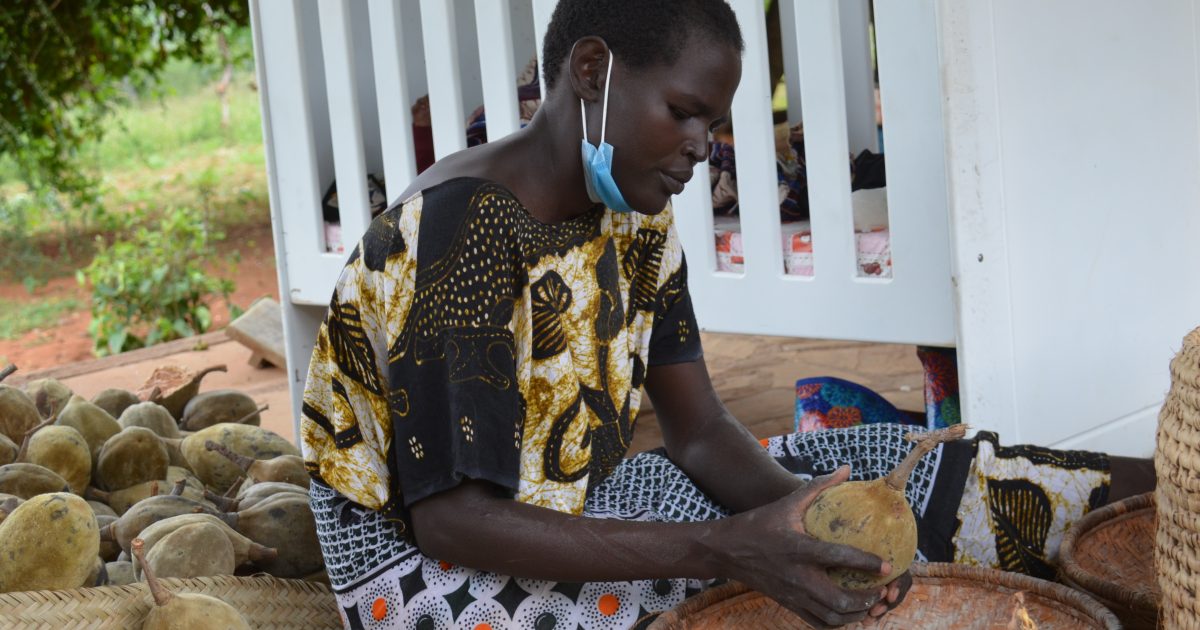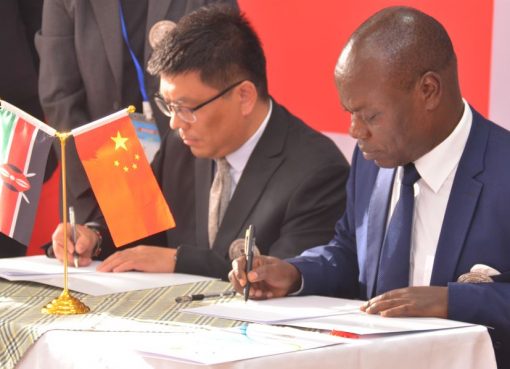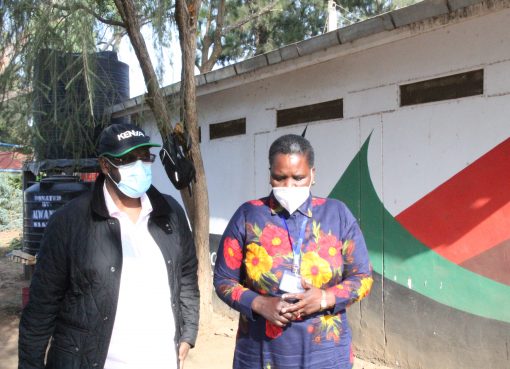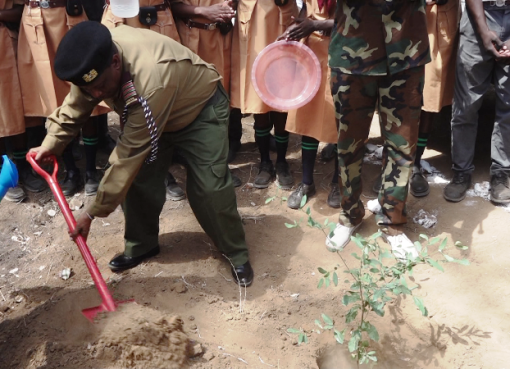Deep in the rugged but hilly countryside of Sunset village in Ghazi area in Voi sub-county, the four women are ready to start what has become a daily ritual at Ms. Faith Mwemba’s farm. They form an imperfect semi-circle around a gnarled trunk of a massive baobab tree but with enough room between them and the tree.
Three of them are armed with sizable twigs. The fourth one, the oldest, stands a short distance away, watching. She is holding a large folded sack in her hands.
“Ready?” Ms. Mwemba calls out.
The others nod. The uniform excited glints in their eyes suggest they find this exercise exciting.
In a synchronized wave, the women bend backwards and start hurling the twigs high up at the large baobab seeds dangling at the edges of the towering branches. A few pieces miss their targets. Others aims are true and the twigs strike home. The big seeds tumble to the ground. The women yell in jubilation.
The old woman with the sack hobbles slowly around the trunk, searching in the grass to retrieve the hurled twigs. She retrieves and brings them to the women throwers. The process starts again.

An hour later, the ground around the baobab is littered with heaps of brown-skinned seeds. The women can call it a day; at least for now. They start gathering the seeds and stuffing them in the sack.
“On a good day, we can fill fifteen sacks of 90kg with the baobab seeds,” says Ms Mwemba, the chair of Mapenzi Women Group.
This daily ritual at the baobab tree has become an unlikely unifying factor for rural women in Sunset and Malope villages in Ngolia Ward who are seeking economic empowerment through the Baobab project that is focusing on value-addition for seeds and baobab flour.
Baobab is locally known as Mbuyu while the seeds are the Mabuyu. The arid and semi-arid conditions that characterize most areas in Taita-Taveta County are suitable for growth of this tree that can grow to over 20 meters in height. The tree is mostly found in several villages in Voi and Taveta sub-counties.
The baobab project is aimed at encouraging rural-based women in the region to start exploiting the potential offered by the trees. One of them is making of baobab yoghurt; a traditional beverage that is processed from white powder extracted from baobab seeds.
Ms. Rachael Kishaga, a member from Malope, says rural women in the area have been making traditional baobab yoghurt for years to drink while working in their farms. She terms the beverage as refreshing and nutritious. She added that the group was looking for sponsors to commercialize the beverage and market it outside the boundaries of the village.
“We eat Ugali with that yoghurt too. With enough training and support, we plan to start making Mabuyu yoghurt to be sold in supermarkets and shops,” she says.
Currently, the women are involved in harvesting and transporting the baobab seeds to Beulah Gardens at Mbulia Farm which is the main collection point. Once at Beulah, the seeds are extracted through manual crushing to remove the seeds and flour.The seeds are later fried over open fire and mixed with assorted ingredients to prepare Mabuyu’ for packing.
The Mabuyu programme is coordinated under ManGo Development, a rural-empowerment Community-Based Organization (CBO) that is based in Norway.
Ms. Rachael Mwakazi Skajaerpe, the project coordinator, terms baobab tree as an economic empowerment tool for rural women. She notes that the huge population of mature baobab trees that actively produce seeds in the region offered a gilt-edge opportunity for women to exploit and monetize the plant.
Ms. Mwakazi added that baobab remains a highly valued tree and once well utilized, it can transform the rural regions.
“The tree offers an opportunity to economically empower the rural women. Baobab seeds once processed make ‘mabuyus’ that are sold in the shops, the husks are used as firewood, the seeds can be pressed for oil and the powder around the seeds can make flour or paste. It is a wholesome tree,” she said.
She adds that baobab trees were so many and were growing wild in the forest with tons of seeds being left to rot on the ground. She predicted that once the local women realize the value of the tree, an economic revolution would sweep across those rural villages that have been plagued by crippling poverty for ages.
As part of enhancing the project, ManGo plans to acquire an automated machine to crush, extract seeds and extract oil for the export market.
“The ultimate goal is to mechanize the project so as to increase our capacity and daily output. This will give the women more impetus to make more deliveries,” she said.
She adds that apart from earning revenue from the baobab, the women are also being trained on financial literacy where accounting basics like book-keeping is emphasised.
“Payments are made through the bank. The women learn to keep tabs on how much they are earning,” she said.
Ms. Catherine Mwakazi, a farmer at Ngolia, is responsible for crushing the baobab seeds with a hammer at Beulah Garden. After breaking the hard shell, she then packs it in large baskets. With her year-old baby sleeping next to the workplace, Ms. Wakesho says such a project can allow women to work and engage in relative peace.
“It is not an easy task because you must use a hammer. I break a hundred seeds per day,” she says. The husks are used as firewood.
The project, at its infancy, has reported some challenges. Mapenzi Women Group members cite lack of requisite tools to ease the harvesting process as a major challenge.
Ms. Mwemba says absence of modern ladders to assist them climb the huge tree trunks force them to twigs and stones to hit at the baobab seeds. This process is arduous, time-consuming and risky. When the throwing of twigs does not, they support the most agile amongst them to climb on their shoulders and make the perilous climb up the trunk to shake the braches for the seeds to fall.
“A tall ladder can be of great help because we can easily reach the tall branches where the seeds are,” she said.
She added that lack of protective attire including gumboots and aprons exposed them to the risk of stepping on snakes that are common in the bush.
By Wagema Mwangi





